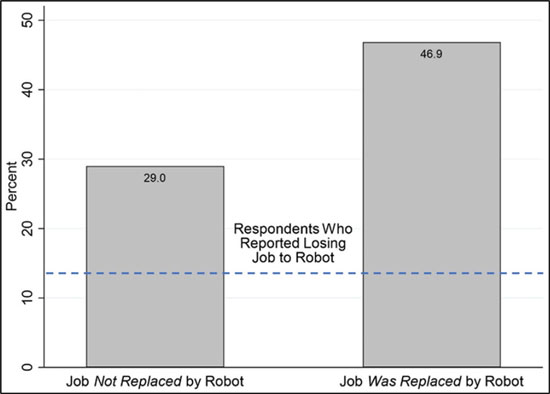Welcome back. Although the blog was down during my futile attempt to catch up on other matters, I continued to review published research and did flag several studies. One of the earliest examined our perception of robots replacing humans in the workplace.
 |
| Industrial robots on the assembly line (from www.therobotreport.com/top-5-countries-using-industrial-robots-2018/). |
A Brigham Young University researcher sides with a positive association that he attributes to employees who possess the skills and expertise to collaborate with robots. He cites, for example, employees working alongside robots that restock workstations or retrieve parts on assembly lines and employees who develop, program, use, maintain or work with robots to perform technologically advanced tasks.
Gauging The Perception
In an effort to better understand the perception of job loss to robots, the researcher commissioned a U.S. national survey of nearly 2,000 individuals by Qualtrics in September 2021. His survey asked respondents (1) to estimate the percentage of employees whose jobs were replaced with robots and (2) if their own jobs had ever been replaced with robots.
Nearly 14% of survey respondents reported that their jobs had indeed been replaced with robots. Those respondents estimated that 47% of workers in the U.S. had lost jobs to robots. In contrast, survey respondents who had not lost jobs to robots estimated that only 29% of employees had their jobs replaced with robots.
 |
| Respondents’ perceptions of the percentage of workers who lost jobs to robots. Note sizable difference between respondents’ perceptions based on whether their own jobs were or were not replaced by robots (46.9% compared to 29.0%). All respondents’ perceptions overestimated those in the sample who jobs were actually replaced by robots (blue dashed line at 13.7 percent). (from journals.sagepub.com/doi/10.1177/23780231221131377). |
As you might expect, a comparison of perceptions by whether respondents lost jobs to robots suggests that one’s own job experience serves to bias perception toward others having had the same experience.
Wrap Up
The survey results are consistent with previous studies, which suggest that workplaces are integrating robots with employees in ways that generate more value for human labor. Robots are not displacing workers; at least not at the rate we might think from attention-grabbing headlines that predict a dire future of employment. The only sure prediction is that workplaces will continue to evolve.
The researcher writes that we make the mistake of expecting novel technologies to be adopted without considering all relevant contextual impediments--cultural, economic and government arrangements that support the manufacturing, sale and use of the technology. Just because a technology can be used for something does not ensure that it will be, or how quickly.
Thanks for stopping by.
P.S.
Study of perception of robots replacing workers in Socius: Sociological Research for a Dynamic World journal: journals.sagepub.com/doi/10.1177/23780231221131377
Article on study on EurekAlert! website: www.eurekalert.org/news-releases/970815

No comments:
Post a Comment